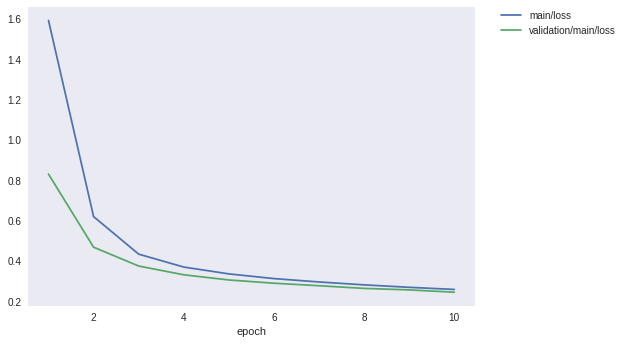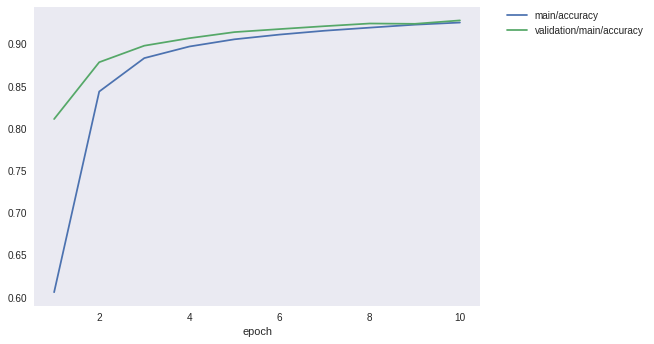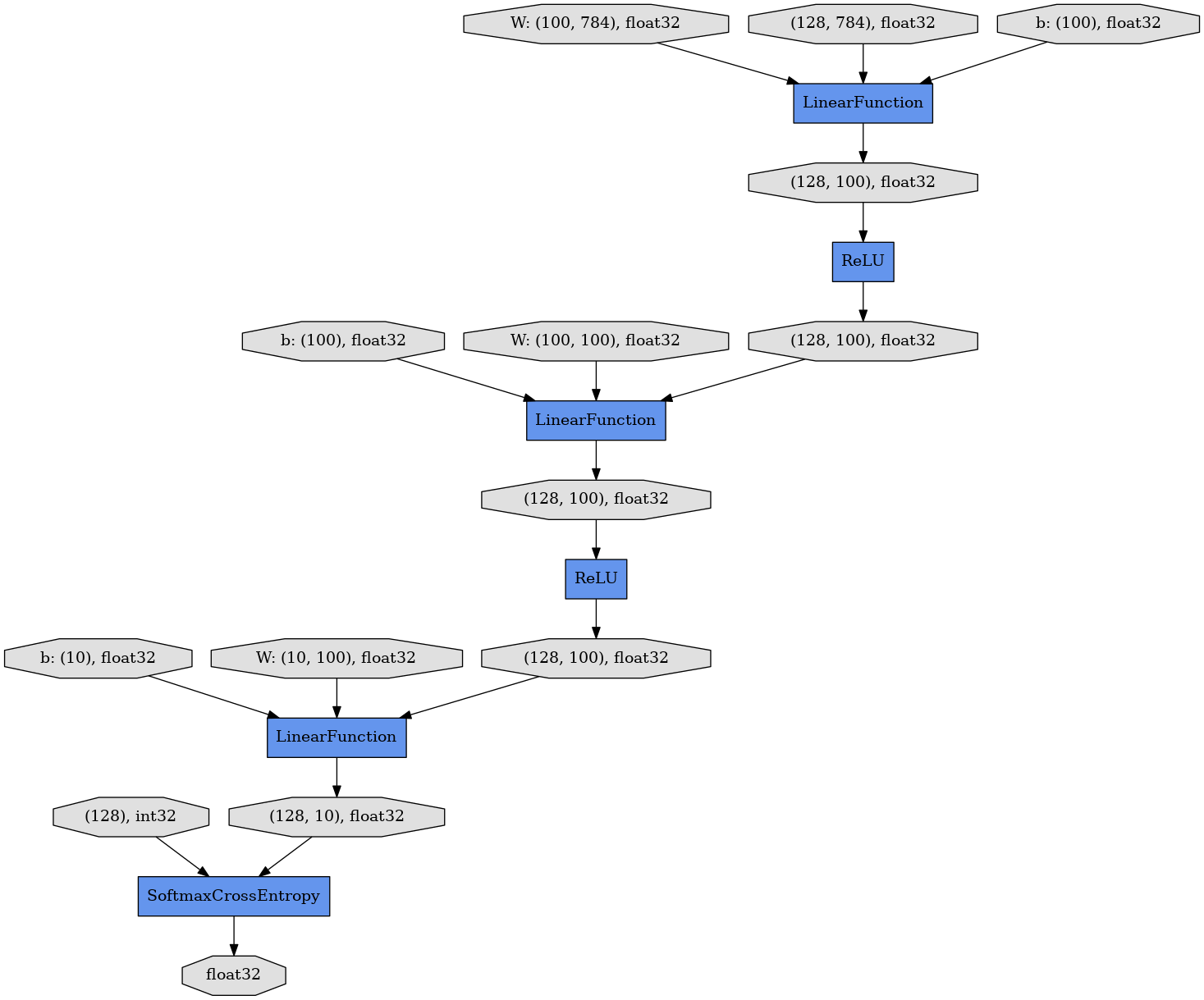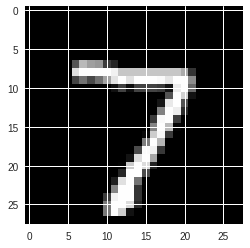Using the Trainer feature¶
Chainer has a feature called Trainer that can often be used to simplify the process of training and evaluating a model. This feature supports training a model in a way such that the user is not required to explicitly write the code for the training loop. For many types of models, including our MNIST model, Trainer allows us to write our training and evaluation code much more concisely.
Chainer contains several extensions that can be used with Trainer to visualize your results, evaluate your model, store and manage log files more easily.
This example will show how to use the Trainer feature to train a fully-connected feed-forward neural network on the MNIST dataset.
[1]:
# Install Chainer and CuPy!
!curl https://colab.chainer.org/install | sh -
Reading package lists... Done
Building dependency tree
Reading state information... Done
libcusparse8.0 is already the newest version (8.0.61-1).
libnvrtc8.0 is already the newest version (8.0.61-1).
libnvtoolsext1 is already the newest version (8.0.61-1).
0 upgraded, 0 newly installed, 0 to remove and 1 not upgraded.
Requirement already satisfied: cupy-cuda80==4.0.0b3 from https://github.com/kmaehashi/chainer-colab/releases/download/2018-02-06/cupy_cuda80-4.0.0b3-cp36-cp36m-linux_x86_64.whl in /usr/local/lib/python3.6/dist-packages
Requirement already satisfied: fastrlock>=0.3 in /usr/local/lib/python3.6/dist-packages (from cupy-cuda80==4.0.0b3)
Requirement already satisfied: numpy>=1.9.0 in /usr/local/lib/python3.6/dist-packages (from cupy-cuda80==4.0.0b3)
Requirement already satisfied: six>=1.9.0 in /usr/local/lib/python3.6/dist-packages (from cupy-cuda80==4.0.0b3)
Requirement already satisfied: chainer==4.0.0b3 in /usr/local/lib/python3.6/dist-packages
Requirement already satisfied: protobuf>=3.0.0 in /usr/local/lib/python3.6/dist-packages (from chainer==4.0.0b3)
Requirement already satisfied: numpy>=1.9.0 in /usr/local/lib/python3.6/dist-packages (from chainer==4.0.0b3)
Requirement already satisfied: filelock in /usr/local/lib/python3.6/dist-packages (from chainer==4.0.0b3)
Requirement already satisfied: six>=1.9.0 in /usr/local/lib/python3.6/dist-packages (from chainer==4.0.0b3)
Requirement already satisfied: setuptools in /usr/lib/python3/dist-packages (from protobuf>=3.0.0->chainer==4.0.0b3)
1. Prepare the dataset¶
Load the MNIST dataset, as in the previous notebook.
[2]:
from chainer.datasets import mnist
train, test = mnist.get_mnist()
/usr/local/lib/python3.6/dist-packages/cupy/core/fusion.py:659: FutureWarning: cupy.core.fusion is experimental. The interface can change in the future.
util.experimental('cupy.core.fusion')
Downloading from http://yann.lecun.com/exdb/mnist/train-images-idx3-ubyte.gz...
Downloading from http://yann.lecun.com/exdb/mnist/train-labels-idx1-ubyte.gz...
Downloading from http://yann.lecun.com/exdb/mnist/t10k-images-idx3-ubyte.gz...
Downloading from http://yann.lecun.com/exdb/mnist/t10k-labels-idx1-ubyte.gz...
2. Prepare the dataset iterators¶
[ ]:
from chainer import iterators
batchsize = 128
train_iter = iterators.SerialIterator(train, batchsize)
test_iter = iterators.SerialIterator(test, batchsize, False, False)
3. Prepare the Model¶
We use the same model as before.
[ ]:
import chainer
import chainer.links as L
import chainer.functions as F
class MLP(chainer.Chain):
def __init__(self, n_mid_units=100, n_out=10):
super(MLP, self).__init__()
with self.init_scope():
self.l1=L.Linear(None, n_mid_units)
self.l2=L.Linear(None, n_mid_units)
self.l3=L.Linear(None, n_out)
def __call__(self, x):
h1 = F.relu(self.l1(x))
h2 = F.relu(self.l2(h1))
return self.l3(h2)
gpu_id = 0 # Set to -1 if you don't have a GPU
model = MLP()
if gpu_id >= 0:
model.to_gpu(gpu_id)
4. Prepare the Updater¶
As mentioned above, the trainer object (instance of Trainer) actually implements the training loop for us. However, before we can use it, we must first prepare another object that will actually perform one iteration of training operations and pass it to the trainer. This other object will be an subclass of Updater such as StandardUpdater or a custom subclass. It will therefore need to hold all of the components that are needed in order to perform one iteration of training, such as a
dataset iterator, and optimizer that also holds the model.
- Updater
- Iterator
- Dataset
- Optimizer
- Model
- Iterator
Since we can also write customized updaters, they can perform any kinds of computations. However, for this example we will use the StandardUpdater which performs the following steps each time it is called:
- Retrieve a batch of data from a dataset using the iterator that we supplied.
- Feed the batch into the model and calculate the loss using the optimizer that we supplied. Since we will supply the model to the optimizer first, this means that the updater can also access the model from the optimizer.
- Update the model parameters using the optimizer that we supplied.
Once the updater has been set up, we can pass it to the trainer and start the training process. The trainer will then automatically create the training loop and call the updater once per iteration.
Now let’s create the updater object.
[ ]:
from chainer import optimizers
from chainer import training
max_epoch = 10
# Note: L.Classifier is actually a chain that wraps 'model' to add a loss
# function.
# Since we do not specify a loss funciton here, the default
# 'softmax_cross_entropy' is used.
# The output of this modified 'model' will now be a loss value instead
# of a class label prediction.
model = L.Classifier(model)
# Send the model to the GPU.
if gpu_id >= 0:
model.to_gpu(gpu_id)
# selection of your optimizing method
optimizer = optimizers.SGD()
# Give the optimizer a reference to the model
optimizer.setup(model)
# Get an Updater that uses the Iterator and Optimizer
updater = training.StandardUpdater(train_iter, optimizer, device=gpu_id)
NOTE¶
The L.Classifier object is actually a chain that places our model in its predictor attribute. This modifies model so that when it is called, it will now take both the input image batch and a class label batch as inputs to its __call__ method and output a Variable that contains the loss value. The loss function to use can be optionally set but we use the default which is softmax_cross_entropy.
Specifically, when __call__ is called on our model (which is now a L.Classifier object), the image batch is supplied to its predictor attribute, which contains our MLP model. The ourput of the MLP (which consists of class label predictions) is supplied to the loss function along with the target class labels to compute the loss value which is then returned as a Variable object.
Note that we use StandardUpdater, which is the simplest type of Updater in Chainer. There are also other types of updaters available, such as ParallelUpdater (which is intended for multiple GPUs) and you can also write a custom updater if you wish.
5. Setup Trainer¶
Now that we have set up an updater, we can pass it to a Trainer object. You can optionally pass a stop_trigger to the second trainer argument as a tuple, (length, unit) to tell the trainer stop automatically according to your indicated timing. The length is given as an arbitrary integer and unit is given as a string which currently must be either epoch or iteration. Without setting stop_trigger, the training will not stop automatically.
[ ]:
# Send Updater to Trainer
trainer = training.Trainer(updater, (max_epoch, 'epoch'),
out='mnist_result')
The out argument in the trainer will set up an output directory to save the logfiles, the image files of graphs to show the time progress of loss, accuracy, etc.
Next, we will explain how to display/save those outputs by using extensions.
6. Add extensions to trainer¶
There are several optional trainer extensions that provide the following capabilites:
- Save log files automatically (
LogReport) - Display the training information to the terminal periodically (
PrintReport) - Visualize the loss progress by plottig a graph periodically and save its image (
PlotReport) - Automatically serialize the model or the state of Optimizer periodically (
snapshot/snapshot_object) - Display Progress Bar to show the progress of training (
ProgressBar) - Save the model architecture as a dot format readable by
Graphviz(dump_graph)
Now you can utilize the wide variety of tools shown above right away! To do so, simply pass the desired extensions object to the Trainer object by using the extend() method of Trainer.
[ ]:
from chainer.training import extensions
trainer.extend(extensions.LogReport())
trainer.extend(extensions.PrintReport(['epoch', 'main/loss', 'main/accuracy', 'validation/main/loss', 'validation/main/accuracy', 'elapsed_time']))
trainer.extend(extensions.PlotReport(['main/loss', 'validation/main/loss'], x_key='epoch', file_name='loss.png'))
trainer.extend(extensions.PlotReport(['main/accuracy', 'validation/main/accuracy'], x_key='epoch', file_name='accuracy.png'))
trainer.extend(extensions.snapshot(filename='snapshot_epoch-{.updater.epoch}'))
trainer.extend(extensions.snapshot_object(model.predictor, filename='model_epoch-{.updater.epoch}'))
trainer.extend(extensions.Evaluator(test_iter, model, device=gpu_id))
trainer.extend(extensions.dump_graph('main/loss'))
LogReport¶
Collect loss and accuracy automatically every epoch or iteration and store the information under the log file in the directory assigned by the out argument of Trainer.
PrintReport¶
Reporter aggregates the results to output to the standard output. The timing for displaying the output can be given by the list.
PlotReport¶
PlotReport plots the values specified by its arguments, draws the graph and saves the image in the directory set by ‘file name’.
snapshot¶
The snapshot method saves the Trainer object at the designated timing (defaut: every epoch) in the directory assigned by out argument in Trainer. The Trainer object, as mentioned before, has an Updater which contains an Optimizer and a model inside. Therefore, as long as you have the snapshot file, you can use it to come back to the training or make inferences using the previously trained model later.
snapshot_object¶
When you save the whole Trainer object, in some cases it is very tedious to retrieve only the inside of the model. By using snapshot_object, you can save the particular object (in this case, the model wrapped by Classifier) in addition to saving the Trainer object. Classifier is a Chain object that keeps the Chain object given by the first argument as a property called predictor and calculates the loss. Classifier doesn’t have any parameters other than those
inside its predictor model, and so we only save model.predictor.
Evaluator¶
The Iterator that uses the evaluation dataset (such as a validation or test dataset) and the model object are passed to Evaluator. The Evaluator evaluates the model using the given dataset at the specified timing interval.
dump_graph¶
This method saves the computational graph of the model. The graph is saved in Graphviz dot format. The output location (directory) to save the graph is set by the out argument of Trainer.
The extensions class has a lot of options other than those mentioned here. For instance, by using the trigger option, you can set individual timings to activate the extensions more flexibly. Please take a look at the official document in more detail:Trainer extensions
7. Start Training¶
To start training, just call run method from Trainer object.
[8]:
trainer.run()
epoch main/loss main/accuracy validation/main/loss validation/main/accuracy elapsed_time
1 1.59174 0.605827 0.830716 0.811017 11.9659
2 0.620236 0.8436 0.468635 0.878362 15.3477
3 0.434218 0.883229 0.375343 0.897943 18.6432
4 0.370276 0.896985 0.331921 0.906843 21.9966
5 0.336392 0.905517 0.306286 0.914062 25.3211
6 0.313135 0.911114 0.290228 0.917623 28.6711
7 0.296385 0.915695 0.277794 0.921084 32.0399
8 0.282124 0.919338 0.264538 0.924248 35.3713
9 0.269923 0.922858 0.257158 0.923853 38.7191
10 0.25937 0.925373 0.245689 0.927907 42.0867
Let’s see the graph of loss saved in the mnist_result directory.
[9]:
from IPython.display import Image
Image(filename='mnist_result/loss.png')
[9]:

How about the accuracy?
[10]:
Image(filename='mnist_result/accuracy.png')
[10]:

Furthermore, let’s visualize the computational graph output by dump_graph of extensions using Graphviz.
[13]:
!apt-get install graphviz -y
!dot -Tpng mnist_result/cg.dot -o mnist_result/cg.png
Reading package lists... Done
Building dependency tree
Reading state information... Done
The following additional packages will be installed:
fontconfig libcairo2 libcdt5 libcgraph6 libdatrie1 libgd3 libgraphite2-3
libgvc6 libgvpr2 libharfbuzz0b libice6 libjbig0 libltdl7 libpango-1.0-0
libpangocairo-1.0-0 libpangoft2-1.0-0 libpathplan4 libpixman-1-0 libsm6
libthai-data libthai0 libtiff5 libwebp6 libxaw7 libxcb-render0 libxcb-shm0
libxext6 libxmu6 libxpm4 libxt6 x11-common
Suggested packages:
gsfonts graphviz-doc libgd-tools
The following NEW packages will be installed:
fontconfig graphviz libcairo2 libcdt5 libcgraph6 libdatrie1 libgd3
libgraphite2-3 libgvc6 libgvpr2 libharfbuzz0b libice6 libjbig0 libltdl7
libpango-1.0-0 libpangocairo-1.0-0 libpangoft2-1.0-0 libpathplan4
libpixman-1-0 libsm6 libthai-data libthai0 libtiff5 libwebp6 libxaw7
libxcb-render0 libxcb-shm0 libxext6 libxmu6 libxpm4 libxt6 x11-common
0 upgraded, 32 newly installed, 0 to remove and 1 not upgraded.
Need to get 4,228 kB of archives.
After this operation, 21.2 MB of additional disk space will be used.
Get:1 http://archive.ubuntu.com/ubuntu artful/main amd64 libxext6 amd64 2:1.3.3-1 [29.4 kB]
Get:2 http://archive.ubuntu.com/ubuntu artful/main amd64 fontconfig amd64 2.11.94-0ubuntu2 [177 kB]
Get:3 http://archive.ubuntu.com/ubuntu artful/main amd64 x11-common all 1:7.7+19ubuntu3 [22.0 kB]
Get:4 http://archive.ubuntu.com/ubuntu artful/main amd64 libice6 amd64 2:1.0.9-2 [40.2 kB]
Get:5 http://archive.ubuntu.com/ubuntu artful/main amd64 libsm6 amd64 2:1.2.2-1 [15.8 kB]
Get:6 http://archive.ubuntu.com/ubuntu artful/main amd64 libjbig0 amd64 2.1-3.1 [26.6 kB]
Get:7 http://archive.ubuntu.com/ubuntu artful/main amd64 libcdt5 amd64 2.38.0-16ubuntu2 [19.5 kB]
Get:8 http://archive.ubuntu.com/ubuntu artful/main amd64 libcgraph6 amd64 2.38.0-16ubuntu2 [40.0 kB]
Get:9 http://archive.ubuntu.com/ubuntu artful/main amd64 libtiff5 amd64 4.0.8-5 [150 kB]
Get:10 http://archive.ubuntu.com/ubuntu artful/main amd64 libwebp6 amd64 0.6.0-3 [181 kB]
Get:11 http://archive.ubuntu.com/ubuntu artful/main amd64 libxpm4 amd64 1:3.5.12-1 [34.0 kB]
Get:12 http://archive.ubuntu.com/ubuntu artful/main amd64 libgd3 amd64 2.2.5-3 [119 kB]
Get:13 http://archive.ubuntu.com/ubuntu artful/main amd64 libpixman-1-0 amd64 0.34.0-1 [230 kB]
Get:14 http://archive.ubuntu.com/ubuntu artful/main amd64 libxcb-render0 amd64 1.12-1ubuntu1 [14.8 kB]
Get:15 http://archive.ubuntu.com/ubuntu artful/main amd64 libxcb-shm0 amd64 1.12-1ubuntu1 [5,482 B]
Get:16 http://archive.ubuntu.com/ubuntu artful/main amd64 libcairo2 amd64 1.14.10-1ubuntu1 [558 kB]
Get:17 http://archive.ubuntu.com/ubuntu artful/main amd64 libltdl7 amd64 2.4.6-2 [38.8 kB]
Get:18 http://archive.ubuntu.com/ubuntu artful/main amd64 libthai-data all 0.1.26-3 [132 kB]
Get:19 http://archive.ubuntu.com/ubuntu artful/main amd64 libdatrie1 amd64 0.2.10-5 [17.6 kB]
Get:20 http://archive.ubuntu.com/ubuntu artful/main amd64 libthai0 amd64 0.1.26-3 [17.7 kB]
Get:21 http://archive.ubuntu.com/ubuntu artful/main amd64 libpango-1.0-0 amd64 1.40.12-1 [152 kB]
Get:22 http://archive.ubuntu.com/ubuntu artful/main amd64 libgraphite2-3 amd64 1.3.10-2 [78.3 kB]
Get:23 http://archive.ubuntu.com/ubuntu artful/main amd64 libharfbuzz0b amd64 1.4.2-1 [211 kB]
Get:24 http://archive.ubuntu.com/ubuntu artful/main amd64 libpangoft2-1.0-0 amd64 1.40.12-1 [33.2 kB]
Get:25 http://archive.ubuntu.com/ubuntu artful/main amd64 libpangocairo-1.0-0 amd64 1.40.12-1 [20.8 kB]
Get:26 http://archive.ubuntu.com/ubuntu artful/main amd64 libpathplan4 amd64 2.38.0-16ubuntu2 [22.6 kB]
Get:27 http://archive.ubuntu.com/ubuntu artful/main amd64 libgvc6 amd64 2.38.0-16ubuntu2 [587 kB]
Get:28 http://archive.ubuntu.com/ubuntu artful/main amd64 libgvpr2 amd64 2.38.0-16ubuntu2 [167 kB]
Get:29 http://archive.ubuntu.com/ubuntu artful/main amd64 libxt6 amd64 1:1.1.5-1 [160 kB]
Get:30 http://archive.ubuntu.com/ubuntu artful/main amd64 libxmu6 amd64 2:1.1.2-2 [46.0 kB]
Get:31 http://archive.ubuntu.com/ubuntu artful/main amd64 libxaw7 amd64 2:1.0.13-1 [173 kB]
Get:32 http://archive.ubuntu.com/ubuntu artful/main amd64 graphviz amd64 2.38.0-16ubuntu2 [710 kB]
Fetched 4,228 kB in 4s (954 kB/s)
Extracting templates from packages: 100%
Selecting previously unselected package libxext6:amd64.
(Reading database ... 16692 files and directories currently installed.)
Preparing to unpack .../00-libxext6_2%3a1.3.3-1_amd64.deb ...
Unpacking libxext6:amd64 (2:1.3.3-1) ...
Selecting previously unselected package fontconfig.
Preparing to unpack .../01-fontconfig_2.11.94-0ubuntu2_amd64.deb ...
Unpacking fontconfig (2.11.94-0ubuntu2) ...
Selecting previously unselected package x11-common.
Preparing to unpack .../02-x11-common_1%3a7.7+19ubuntu3_all.deb ...
Unpacking x11-common (1:7.7+19ubuntu3) ...
Selecting previously unselected package libice6:amd64.
Preparing to unpack .../03-libice6_2%3a1.0.9-2_amd64.deb ...
Unpacking libice6:amd64 (2:1.0.9-2) ...
Selecting previously unselected package libsm6:amd64.
Preparing to unpack .../04-libsm6_2%3a1.2.2-1_amd64.deb ...
Unpacking libsm6:amd64 (2:1.2.2-1) ...
Selecting previously unselected package libjbig0:amd64.
Preparing to unpack .../05-libjbig0_2.1-3.1_amd64.deb ...
Unpacking libjbig0:amd64 (2.1-3.1) ...
Selecting previously unselected package libcdt5.
Preparing to unpack .../06-libcdt5_2.38.0-16ubuntu2_amd64.deb ...
Unpacking libcdt5 (2.38.0-16ubuntu2) ...
Selecting previously unselected package libcgraph6.
Preparing to unpack .../07-libcgraph6_2.38.0-16ubuntu2_amd64.deb ...
Unpacking libcgraph6 (2.38.0-16ubuntu2) ...
Selecting previously unselected package libtiff5:amd64.
Preparing to unpack .../08-libtiff5_4.0.8-5_amd64.deb ...
Unpacking libtiff5:amd64 (4.0.8-5) ...
Selecting previously unselected package libwebp6:amd64.
Preparing to unpack .../09-libwebp6_0.6.0-3_amd64.deb ...
Unpacking libwebp6:amd64 (0.6.0-3) ...
Selecting previously unselected package libxpm4:amd64.
Preparing to unpack .../10-libxpm4_1%3a3.5.12-1_amd64.deb ...
Unpacking libxpm4:amd64 (1:3.5.12-1) ...
Selecting previously unselected package libgd3:amd64.
Preparing to unpack .../11-libgd3_2.2.5-3_amd64.deb ...
Unpacking libgd3:amd64 (2.2.5-3) ...
Selecting previously unselected package libpixman-1-0:amd64.
Preparing to unpack .../12-libpixman-1-0_0.34.0-1_amd64.deb ...
Unpacking libpixman-1-0:amd64 (0.34.0-1) ...
Selecting previously unselected package libxcb-render0:amd64.
Preparing to unpack .../13-libxcb-render0_1.12-1ubuntu1_amd64.deb ...
Unpacking libxcb-render0:amd64 (1.12-1ubuntu1) ...
Selecting previously unselected package libxcb-shm0:amd64.
Preparing to unpack .../14-libxcb-shm0_1.12-1ubuntu1_amd64.deb ...
Unpacking libxcb-shm0:amd64 (1.12-1ubuntu1) ...
Selecting previously unselected package libcairo2:amd64.
Preparing to unpack .../15-libcairo2_1.14.10-1ubuntu1_amd64.deb ...
Unpacking libcairo2:amd64 (1.14.10-1ubuntu1) ...
Selecting previously unselected package libltdl7:amd64.
Preparing to unpack .../16-libltdl7_2.4.6-2_amd64.deb ...
Unpacking libltdl7:amd64 (2.4.6-2) ...
Selecting previously unselected package libthai-data.
Preparing to unpack .../17-libthai-data_0.1.26-3_all.deb ...
Unpacking libthai-data (0.1.26-3) ...
Selecting previously unselected package libdatrie1:amd64.
Preparing to unpack .../18-libdatrie1_0.2.10-5_amd64.deb ...
Unpacking libdatrie1:amd64 (0.2.10-5) ...
Selecting previously unselected package libthai0:amd64.
Preparing to unpack .../19-libthai0_0.1.26-3_amd64.deb ...
Unpacking libthai0:amd64 (0.1.26-3) ...
Selecting previously unselected package libpango-1.0-0:amd64.
Preparing to unpack .../20-libpango-1.0-0_1.40.12-1_amd64.deb ...
Unpacking libpango-1.0-0:amd64 (1.40.12-1) ...
Selecting previously unselected package libgraphite2-3:amd64.
Preparing to unpack .../21-libgraphite2-3_1.3.10-2_amd64.deb ...
Unpacking libgraphite2-3:amd64 (1.3.10-2) ...
Selecting previously unselected package libharfbuzz0b:amd64.
Preparing to unpack .../22-libharfbuzz0b_1.4.2-1_amd64.deb ...
Unpacking libharfbuzz0b:amd64 (1.4.2-1) ...
Selecting previously unselected package libpangoft2-1.0-0:amd64.
Preparing to unpack .../23-libpangoft2-1.0-0_1.40.12-1_amd64.deb ...
Unpacking libpangoft2-1.0-0:amd64 (1.40.12-1) ...
Selecting previously unselected package libpangocairo-1.0-0:amd64.
Preparing to unpack .../24-libpangocairo-1.0-0_1.40.12-1_amd64.deb ...
Unpacking libpangocairo-1.0-0:amd64 (1.40.12-1) ...
Selecting previously unselected package libpathplan4.
Preparing to unpack .../25-libpathplan4_2.38.0-16ubuntu2_amd64.deb ...
Unpacking libpathplan4 (2.38.0-16ubuntu2) ...
Selecting previously unselected package libgvc6.
Preparing to unpack .../26-libgvc6_2.38.0-16ubuntu2_amd64.deb ...
Unpacking libgvc6 (2.38.0-16ubuntu2) ...
Selecting previously unselected package libgvpr2.
Preparing to unpack .../27-libgvpr2_2.38.0-16ubuntu2_amd64.deb ...
Unpacking libgvpr2 (2.38.0-16ubuntu2) ...
Selecting previously unselected package libxt6:amd64.
Preparing to unpack .../28-libxt6_1%3a1.1.5-1_amd64.deb ...
Unpacking libxt6:amd64 (1:1.1.5-1) ...
Selecting previously unselected package libxmu6:amd64.
Preparing to unpack .../29-libxmu6_2%3a1.1.2-2_amd64.deb ...
Unpacking libxmu6:amd64 (2:1.1.2-2) ...
Selecting previously unselected package libxaw7:amd64.
Preparing to unpack .../30-libxaw7_2%3a1.0.13-1_amd64.deb ...
Unpacking libxaw7:amd64 (2:1.0.13-1) ...
Selecting previously unselected package graphviz.
Preparing to unpack .../31-graphviz_2.38.0-16ubuntu2_amd64.deb ...
Unpacking graphviz (2.38.0-16ubuntu2) ...
Setting up libpathplan4 (2.38.0-16ubuntu2) ...
Setting up libxcb-render0:amd64 (1.12-1ubuntu1) ...
Setting up libxext6:amd64 (2:1.3.3-1) ...
Setting up libjbig0:amd64 (2.1-3.1) ...
Setting up libdatrie1:amd64 (0.2.10-5) ...
Setting up libtiff5:amd64 (4.0.8-5) ...
Setting up libgraphite2-3:amd64 (1.3.10-2) ...
Setting up libpixman-1-0:amd64 (0.34.0-1) ...
Processing triggers for libc-bin (2.26-0ubuntu2.1) ...
Setting up libltdl7:amd64 (2.4.6-2) ...
Setting up libxcb-shm0:amd64 (1.12-1ubuntu1) ...
Setting up libxpm4:amd64 (1:3.5.12-1) ...
Setting up libthai-data (0.1.26-3) ...
Setting up x11-common (1:7.7+19ubuntu3) ...
update-rc.d: warning: start and stop actions are no longer supported; falling back to defaults
invoke-rc.d: could not determine current runlevel
invoke-rc.d: policy-rc.d denied execution of start.
Setting up libcdt5 (2.38.0-16ubuntu2) ...
Setting up fontconfig (2.11.94-0ubuntu2) ...
Regenerating fonts cache... done.
Setting up libcgraph6 (2.38.0-16ubuntu2) ...
Setting up libwebp6:amd64 (0.6.0-3) ...
Setting up libcairo2:amd64 (1.14.10-1ubuntu1) ...
Setting up libgvpr2 (2.38.0-16ubuntu2) ...
Setting up libgd3:amd64 (2.2.5-3) ...
Setting up libharfbuzz0b:amd64 (1.4.2-1) ...
Setting up libthai0:amd64 (0.1.26-3) ...
Setting up libpango-1.0-0:amd64 (1.40.12-1) ...
Setting up libice6:amd64 (2:1.0.9-2) ...
Setting up libsm6:amd64 (2:1.2.2-1) ...
Setting up libpangoft2-1.0-0:amd64 (1.40.12-1) ...
Setting up libxt6:amd64 (1:1.1.5-1) ...
Setting up libpangocairo-1.0-0:amd64 (1.40.12-1) ...
Setting up libxmu6:amd64 (2:1.1.2-2) ...
Setting up libxaw7:amd64 (2:1.0.13-1) ...
Setting up libgvc6 (2.38.0-16ubuntu2) ...
Setting up graphviz (2.38.0-16ubuntu2) ...
Processing triggers for libc-bin (2.26-0ubuntu2.1) ...
[14]:
Image(filename='mnist_result/cg.png')
[14]:

From the top to the bottom, you can track the data flow of the computations, how data and parameters are passed to what type of Function and the calculated loss is output.
8. Evaluate a pre-trained model¶
[15]:
import numpy as np
from chainer import serializers
from chainer.cuda import to_gpu
from chainer.cuda import to_cpu
model = MLP()
serializers.load_npz('mnist_result/model_epoch-10', model)
%matplotlib inline
import matplotlib.pyplot as plt
x, t = test[0]
plt.imshow(x.reshape(28, 28), cmap='gray')
plt.show()
print('label:', t)
if gpu_id >= 0:
model.to_gpu(gpu_id)
x = to_gpu(x[None, ...])
y = model(x)
y = to_cpu(y.data)
else:
x = x[None, ...]
y = model(x)
y = y.data
print('predicted_label:', y.argmax(axis=1)[0])

label: 7
predicted_label: 7
It successfully executed !!